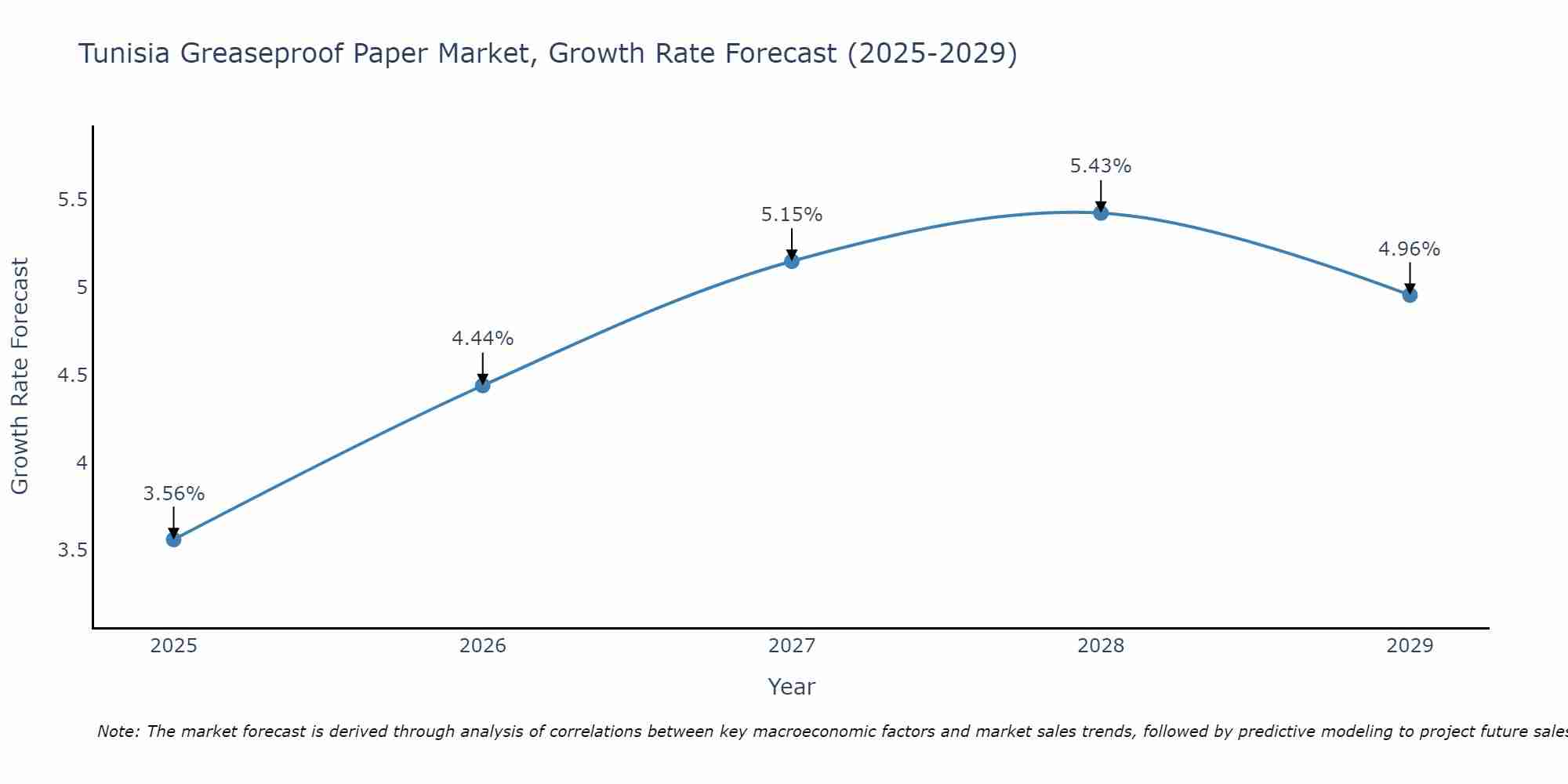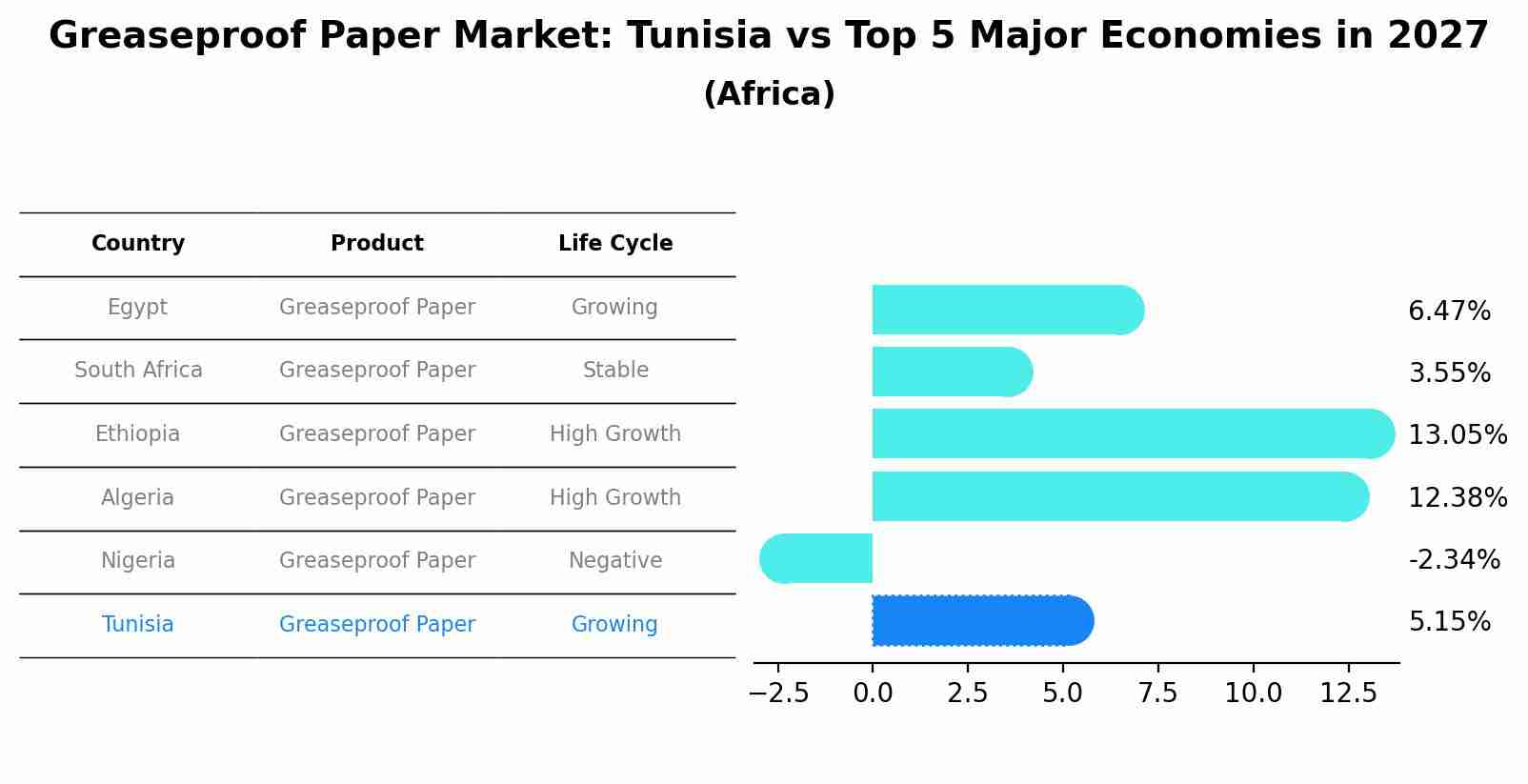Tunisia Greaseproof Paper Market Outlook | Revenue, Analysis, Trends, Value, Companies, Size, Industry, Share, Growth, COVID-19 IMPACT & Forecast
| Product Code: ETC326874 | Publication Date: Aug 2022 | Updated Date: Jun 2025 | Product Type: Market Research Report | |
| Publisher: 6Wresearch | Author: Vasudha | No. of Pages: 75 | No. of Figures: 35 | No. of Tables: 20 |
Tunisia Greaseproof Paper Market Size Growth Rate
The Tunisia Greaseproof Paper Market is projected to witness mixed growth rate patterns during 2025 to 2029. Starting at 3.56% in 2025, the market peaks at 5.43% in 2028, and settles at 4.96% by 2029.

Greaseproof Paper Market: Tunisia vs Top 5 Major Economies in 2027 (Africa)
In the Africa region, the Greaseproof Paper market in Tunisia is projected to expand at a growing growth rate of 5.15% by 2027. The largest economy is Egypt, followed by South Africa, Ethiopia, Algeria and Nigeria.

Tunisia Greaseproof Paper Market Overview
The Tunisia Greaseproof Paper Market is experiencing steady growth due to the increasing demand from the food service industry. Greaseproof paper is widely used for wrapping food items such as sandwiches, burgers, pastries, and other fast food items to prevent grease and oil from seeping through the packaging. The market is driven by the rising trend of on-the-go food consumption and the growing awareness among consumers about the importance of sustainable packaging solutions. Key players in the Tunisia Greaseproof Paper Market include local manufacturers as well as international companies aiming to capitalize on the expanding food service sector in the country. The market is expected to continue its growth trajectory as more food businesses adopt eco-friendly packaging options to meet consumer preferences and regulatory requirements.
Tunisia Greaseproof Paper Market Trends
The Tunisia Greaseproof Paper Market is experiencing a growing demand due to the increasing preference for convenient and eco-friendly packaging solutions in the food industry. Consumers are increasingly concerned about the environmental impact of packaging materials, leading to a shift towards sustainable options like greaseproof paper. Additionally, the rise of online food delivery services has further fueled the demand for greaseproof paper for packaging purposes. Manufacturers are focusing on enhancing the quality and performance of greaseproof paper, as well as developing innovative designs to cater to the evolving needs of customers. With the government also promoting sustainable practices, the Tunisia Greaseproof Paper Market is expected to continue its growth trajectory in the coming years.
Tunisia Greaseproof Paper Market Challenges
In the Tunisia Greaseproof Paper Market, some challenges include the fluctuation in raw material prices, which can impact production costs and overall pricing strategies. Another challenge is the competition from alternative packaging materials, such as plastic or aluminum foil, which offer similar properties to greaseproof paper. Additionally, ensuring consistent quality and meeting regulatory requirements for food packaging materials can be a challenge for manufacturers in the market. These challenges require companies to continuously innovate their products, optimize their production processes, and stay abreast of market trends to remain competitive in the Tunisia Greaseproof Paper Market.
Tunisia Greaseproof Paper Market Investment Opportunities
In the Tunisia Greaseproof Paper Market, there are several investment opportunities worth considering. With the growing food service industry in Tunisia, there is an increasing demand for greaseproof paper as it is commonly used in packaging food items to prevent grease and oil from seeping through. Investing in companies that manufacture greaseproof paper or in businesses that utilize greaseproof paper for their packaging needs could be lucrative. Additionally, innovations in eco-friendly and sustainable greaseproof paper products are gaining traction globally, presenting an opportunity for investors to tap into the growing trend towards environmentally friendly packaging solutions. Overall, the Tunisia Greaseproof Paper Market offers potential for growth and profitability for investors looking to capitalize on the expanding food service sector and increasing consumer demand for convenient and sustainable packaging materials.
Tunisia Greaseproof Paper Market Government Policy
Government policies in Tunisia related to the Greaseproof Paper Market focus on promoting domestic production, reducing reliance on imports, and supporting sustainable practices. The government has implemented measures such as import tariffs and subsidies to incentivize local production of greaseproof paper. Additionally, there are regulations in place to ensure environmental sustainability in the production process, including waste management and resource conservation. The government also encourages research and development in the sector to enhance product quality and innovation. Overall, the policies aim to strengthen the competitiveness of the Tunisian greaseproof paper market, support local manufacturers, and reduce the environmental impact of production processes.
Tunisia Greaseproof Paper Market Future Outlook
The Tunisia Greaseproof Paper Market is anticipated to witness steady growth in the coming years. The increasing demand for eco-friendly and sustainable packaging solutions across various industries such as food and beverage, FMCG, and healthcare is expected to drive the market growth. Additionally, the growing awareness among consumers regarding health and hygiene concerns is likely to further boost the demand for greaseproof paper as a preferred packaging material. Manufacturers focusing on product innovation, such as offering greaseproof paper with enhanced barrier properties and customization options, are also expected to contribute to market expansion. However, factors such as fluctuating raw material costs and competition from alternative packaging materials may pose challenges to market growth. Overall, the Tunisia Greaseproof Paper Market is poised for a positive outlook in the foreseeable future.
Key Highlights of the Report:
- Tunisia Greaseproof Paper Market Outlook
- Market Size of Tunisia Greaseproof Paper Market, 2021
- Forecast of Tunisia Greaseproof Paper Market, 2031
- Historical Data and Forecast of Tunisia Greaseproof Paper Revenues & Volume for the Period 2018 - 2031
- Tunisia Greaseproof Paper Market Trend Evolution
- Tunisia Greaseproof Paper Market Drivers and Challenges
- Tunisia Greaseproof Paper Price Trends
- Tunisia Greaseproof Paper Porter's Five Forces
- Tunisia Greaseproof Paper Industry Life Cycle
- Historical Data and Forecast of Tunisia Greaseproof Paper Market Revenues & Volume By End-use for the Period 2018 - 2031
- Historical Data and Forecast of Tunisia Greaseproof Paper Market Revenues & Volume By Release Papers For Technical Lamination for the Period 2018 - 2031
- Historical Data and Forecast of Tunisia Greaseproof Paper Market Revenues & Volume By Graphic Papers for the Period 2018 - 2031
- Historical Data and Forecast of Tunisia Greaseproof Paper Market Revenues & Volume By Baking Paper for the Period 2018 - 2031
- Historical Data and Forecast of Tunisia Greaseproof Paper Market Revenues & Volume By Pet-food Bags for the Period 2018 - 2031
- Historical Data and Forecast of Tunisia Greaseproof Paper Market Revenues & Volume By Pan Liners for the Period 2018 - 2031
- Historical Data and Forecast of Tunisia Greaseproof Paper Market Revenues & Volume By Papers For Textile Cores for the Period 2018 - 2031
- Historical Data and Forecast of Tunisia Greaseproof Paper Market Revenues & Volume By Pulp Composition for the Period 2018 - 2031
- Historical Data and Forecast of Tunisia Greaseproof Paper Market Revenues & Volume By 100 % Sulphite for the Period 2018 - 2031
- Historical Data and Forecast of Tunisia Greaseproof Paper Market Revenues & Volume By 50 % Sulphite, 50 % Sulphate for the Period 2018 - 2031
- Historical Data and Forecast of Tunisia Greaseproof Paper Market Revenues & Volume By 100 % Sulphate for the Period 2018 - 2031
- Historical Data and Forecast of Tunisia Greaseproof Paper Market Revenues & Volume By Paper Treatment for the Period 2018 - 2031
- Historical Data and Forecast of Tunisia Greaseproof Paper Market Revenues & Volume By Starches for the Period 2018 - 2031
- Historical Data and Forecast of Tunisia Greaseproof Paper Market Revenues & Volume By Alginates for the Period 2018 - 2031
- Historical Data and Forecast of Tunisia Greaseproof Paper Market Revenues & Volume By Carboxymethyl Cellulose for the Period 2018 - 2031
- Historical Data and Forecast of Tunisia Greaseproof Paper Market Revenues & Volume By Sales Channel for the Period 2018 - 2031
- Historical Data and Forecast of Tunisia Greaseproof Paper Market Revenues & Volume By Offline for the Period 2018 - 2031
- Historical Data and Forecast of Tunisia Greaseproof Paper Market Revenues & Volume By Online for the Period 2018 - 2031
- Tunisia Greaseproof Paper Import Export Trade Statistics
- Market Opportunity Assessment By End-use
- Market Opportunity Assessment By Pulp Composition
- Market Opportunity Assessment By Paper Treatment
- Market Opportunity Assessment By Sales Channel
- Tunisia Greaseproof Paper Top Companies Market Share
- Tunisia Greaseproof Paper Competitive Benchmarking By Technical and Operational Parameters
- Tunisia Greaseproof Paper Company Profiles
- Tunisia Greaseproof Paper Key Strategic Recommendations
Frequently Asked Questions About the Market Study (FAQs):
- Single User License$ 1,995
- Department License$ 2,400
- Site License$ 3,120
- Global License$ 3,795
Search
Related Reports
- Middle East OLED Market (2025-2031) | Outlook, Forecast, Revenue, Growth, Companies, Analysis, Industry, Share, Trends, Value & Size
- Portugal Occupational Health & Safety Services Market (2025-2031) | Strategy, Consumer Insights, Analysis, Investment Trends, Opportunities, Growth, Size, Share, Industry, Revenue, Segments, Value, Segmentation, Supply, Forecast, Restraints, Outlook, Competition, Drivers, Trends, Demand, Pricing Analysis, Competitive, Strategic Insights, Companies, Challenges
- Netherlands Occupational Health and Safety Services Market (2025-2031) | Strategy, Consumer Insights, Analysis, Investment Trends, Opportunities, Growth, Size, Share, Industry, Revenue, Segments, Value, Segmentation, Supply, Forecast, Restraints, Outlook, Competition, Drivers, Trends, Demand, Pricing Analysis, Competitive, Strategic Insights, Companies, Challenges
- Belgium and Luxembourg Facility Management Market (2025-2031) | Strategy, Consumer Insights, Analysis, Investment Trends, Opportunities, Growth, Size, Share, Industry, Revenue, Segments, Value, Segmentation, Supply, Forecast, Restraints, Outlook, Competition, Drivers, Trends, Demand, Pricing Analysis, Competitive, Strategic Insights, Companies, Challenges
- Russia Women Intimate Apparel Market (2025-2031) | Strategy, Consumer Insights, Analysis, Investment Trends, Opportunities, Growth, Size, Share, Industry, Revenue, Segments, Value, Segmentation, Supply, Forecast, Restraints, Outlook, Competition, Drivers, Trends, Demand, Pricing Analysis, Competitive, Strategic Insights, Companies, Challenges
- Africa Chocolate Market (2025-2031) | Size, Share, Trends, Growth, Revenue, Analysis, Forecast, industry & Outlook
- Global Hydroxychloroquine And Chloroquine Market (2025-2031) | Industry, Trends, Size, Outlook, Growth, Value, Companies, Revenue, Analysis, Share, Forecast
- Saudi Arabia Plant Maintenance Market (2025-2031) | Industry, Size, Growth, Revenue, Value, Companies, Forecast, Analysis, Share & Trends
- Taiwan Electric Truck Market (2025-2031) | Outlook, Industry, Revenue, Size, Forecast, Growth, Analysis, Share, Companies, Value & Trends
- South Korea Electric Bus Market (2025-2031) | Outlook, Industry, Companies, Analysis, Size, Revenue, Value, Forecast, Trends, Growth & Share
Industry Events and Analyst Meet
Our Clients
Whitepaper
- Middle East & Africa Commercial Security Market Click here to view more.
- Middle East & Africa Fire Safety Systems & Equipment Market Click here to view more.
- GCC Drone Market Click here to view more.
- Middle East Lighting Fixture Market Click here to view more.
- GCC Physical & Perimeter Security Market Click here to view more.
6WResearch In News
- Doha a strategic location for EV manufacturing hub: IPA Qatar
- Demand for luxury TVs surging in the GCC, says Samsung
- Empowering Growth: The Thriving Journey of Bangladesh’s Cable Industry
- Demand for luxury TVs surging in the GCC, says Samsung
- Video call with a traditional healer? Once unthinkable, it’s now common in South Africa
- Intelligent Buildings To Smooth GCC’s Path To Net Zero













